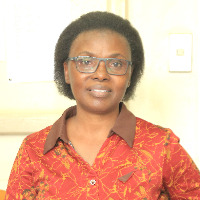pr.cns@mak.ac.ug

Dr. Agnes Nandutu Masawi, PhD
Biography
Dr. Nandutu is a Senior Lecturer, teaching the subject of Biochemistry to Science, Veterinary and Medical students at Makerere University. Dr. Nandutu’s research areas of interest include Food chemistry, food safety, scientific validation of medicinal plants, phytochemical and antioxidant evaluation and starch chemistry. Her PhD study involved investigating Biochemical, physico-chemical and Nutritional properties of sweet potato ( Ipomomea batatas Lam) and its processing into an infant weaning food. The sweet potato-based infant food developed in this study had the potential to be used as weaning food because of its nutritional values and viscoelastic properties, which compared well with commercial baby foods.
In addition to teaching, Agnes has supervised over 12 MSc. and 4 PhD students and published several articles in refereed journals. She has participated in several projects, but not limited to what is listed below:
Education
Publications
Below is a list of research projects that Dr. Nandutu Agnes Masawi has participated in:
- Retention studies of processed products from orange-fleshed sweet potato, a staple food for rural communities in Uganda. This was a collaborative study with HarvestPlus and was supported by IFPRI and CIAT
- Biochemical analysis of vitamin A, iron and infection status among women and children in Uganda: a baseline survey. A collaborative study with HarvestPlus supported by IFPRI and CIAT
- Postharvest quality of Solanum aethiopicum leafy vegetable subjected to various handling and storage technologies.
- The protective properties of different phytochemicals against non-infectious diseases such as diabetes mellitus.
- Currently involved in the Eco-innovative Technologies for improved Nutrition, sustainable Production and Marketing of Agro-ecological Food products in Africa (Innoecofood).
Grants Obtained
2008: Biochemical analysis of vitamin A, iron and infection status among women and children in Uganda: a baseline survey. This is also a collaborative study with HarvestPlus supported by IFPRI and CIAT given USD150,000
2008: Targeting Gene-based Markers Associated with Drought Tolerance Mechanisms for cassava breeding Supported by Millenium Science Initiative (MSI) (World Bank) but working on the biochemical aspects. We were given USD 250,000
2024: Assessing feasibility, acceptability and utility of Tuberclosis-Molecular Bacterial Load Assay for monitoring TB treatment in three HIV clinics in Kampala (PI) funded by MAkRiF
2024 Eco-innovative Technologies for improved Nutrition, sustainable production and Marketing of Agro-ecological Food products in Africa (Innoecofood) funded European Union.


